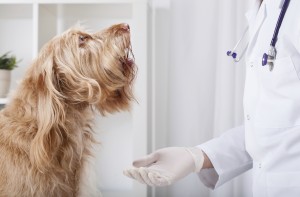Pet Respiratory Problems: A Primer for Owners
 If you have ever had trouble breathing, you know how scary a feeling it can be. There are many causes of breathing trouble in pets, just as with people, but they all result in difficulty taking a breath.
If you have ever had trouble breathing, you know how scary a feeling it can be. There are many causes of breathing trouble in pets, just as with people, but they all result in difficulty taking a breath.
If you have a pet who can’t catch his or her breath, we are going to teach you what you need to know. Pet respiratory problems shouldn’t be taken lightly. Keep reading so that you can breathe easier when caring for your breathing-challenged pet.
Signs of Respiratory Problems
If your pet is having trouble breathing, it is important to have him or her examined right away. Even mild problems can progress rapidly, and you don’t want to wait until things are bad.
If your pet is having any of the following symptoms, please call your veterinarian so that he or she can assess the situation immediately:
- Coughing or gagging
- Heavy breathing, especially while resting
- Exercise intolerance
- Fainting spells
- Noisy breathing
- Gray or blue color to the lips, gums, and/or tongue
- Breathing with an open mouth (cats)
- Increased breathing effort
- Standing with an out-stretched neck
Causes of Pet Respiratory Problems
Many pet respiratory problems can present similarly, and often your veterinarian will need to run a few tests to determine the problem. A few of the more common reasons a pet may have trouble breathing include:
- Cardiac (heart) problems
- Pneumonia
- Asthma or bronchitis
- Laryngeal paralysis
- Cancer
- Heat stroke
- Infectious causes such as canine influenza or fungal infections
- Parasites such as heartworms
- Trauma
Diagnosis and Treatment
When a patient is having trouble breathing (called dyspnea), your veterinarian will often use oxygen therapy to help them get a good breath while trying to determine what is going on. Often blood tests, x-rays, or ultrasound evaluation of the heart are utilized to determine a pet’s diagnosis and your pet may be referred to us here at Oakland Veterinary Referral Services for assistance in testing or diagnosis.
Once your veterinary team is able to determine a likely cause for your pet’s respiratory problem, they will outline a treatment plan for your pet. This is highly dependent on the pet’s overall condition, diagnosis, and expected progression of the disease.
Some pets may need to stay in the hospital while beginning treatment so that they can be monitored closely and/or receive treatments such as oxygen therapy. Others may be discharged with medications and instructions for management of the problem at home.
What You can Do
Depending on the cause, many pets with respiratory problems will live normal, happy lives. Some problems (such as pneumonia) can be cured while others (like asthma) will require ongoing care.
As your pet’s caretaker, you are the crucial factor in successfully helping your pet breathe. Careful monitoring at home is crucial in detecting problems early and recognizing change in an ongoing condition.
If you have a pet with a more chronic respiratory problem, such as asthma or bronchitis, it is essential to take steps at home to help your pet breathe easier. Be sure to follow recommendations and:
- Maintain your pet at an ideal body weight
- Eliminate cigarette smoke, perfumes, and air fresheners from the home
- Keep a low-dust environment
- Consider installing a HEPA air filtration system
It is also important that pet owners seek veterinary care as soon as they notice your pet may be having breathing trouble. When in doubt, it is best to have your pet examined to get treatment started right away so that your pet can feel better quicker. Oftentimes, timely treatment equates to a better prognosis as well.
If you think your pet may be experiencing a respiratory problem, let your veterinarian know right away or visit our 24/7 Emergency Room. We are a top emergency and critical care center in southeast Michigan with a staff trained in advanced critical care. We are always here to help.


